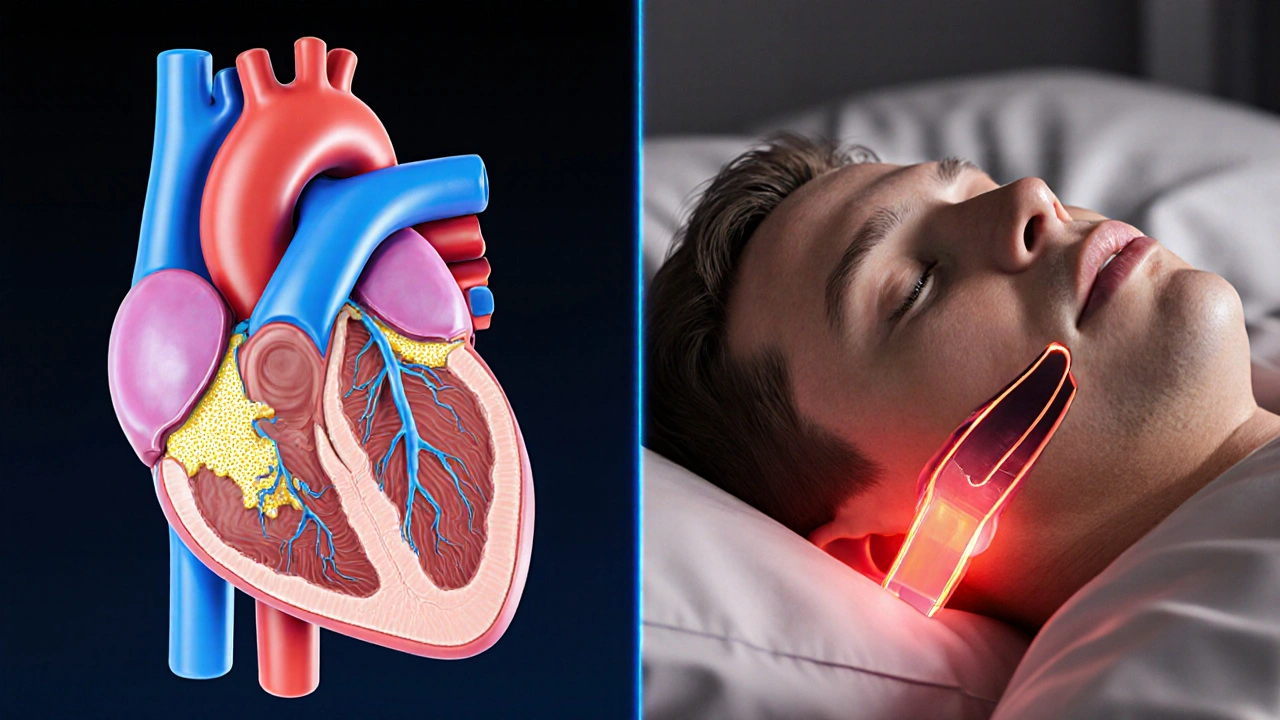Sleep Apnea: Causes, Risks, and Treatment Options
When dealing with Sleep Apnea, a disorder where breathing repeatedly stops during sleep. Also known as sleep‑disordered breathing, it can affect anyone but shows up most often in adults who are overweight or have a family history.
Key Types, Treatments, and Health Connections
The most common form is Obstructive Sleep Apnea, where throat muscles collapse and block the airway. This blockage forces the brain to briefly wake you up, often without you remembering. The wake‑ups trigger a cascade: blood pressure spikes, heart must work harder, and cortisol levels rise. Over time, those stressors raise the Cardiovascular Risk, the chance of heart disease, stroke, and irregular heartbeats. The most effective way to stop the cycle is a Continuous Positive Airway Pressure (CPAP), a machine that pushes air into the airway to keep it open device every night.
Sleep apnea often leads to excessive daytime sleepiness, poor concentration, and mood swings. Those symptoms can masquerade as depression or anxiety, making it tricky to spot the real cause. A simple screening—like the Epworth Sleepiness Scale—can flag the problem early. If the score suggests trouble, a sleep study (polysomnography) provides the definitive diagnosis by measuring breathing patterns, oxygen levels, and brain activity throughout the night.
Weight management, positional therapy, and avoiding alcohol before bed are low‑cost steps that improve airway patency. For many, losing just 10 % of body weight drops the apnea‑hypopnea index (AHI) dramatically. However, when anatomy plays the dominant role—big tonsils, a recessed jaw—medical devices or surgery become necessary. Dental appliances that advance the lower jaw can work for mild to moderate cases, while uvulopalatopharyngoplasty (UPPP) or maxillomandibular advancement surgery targets severe obstruction.
Because sleep apnea ties closely to heart rhythm problems, it often appears alongside conditions covered in our other articles. For instance, atrial fibrillation in pregnancy, metoprolol use in cardiac rehab, and efavirenz’s impact on heart health all share the theme of cardiovascular strain. Understanding how untreated sleep apnea can worsen these issues helps you see the bigger picture: a sleeping airway that’s constantly closing adds extra load to an already stressed heart.
Medication interactions matter, too. Certain sedatives and antihistamines relax throat muscles further, aggravating apnea episodes. If you’re on drugs like metoprolol or aspirin for heart protection, talk to your doctor about whether a CPAP machine could reduce the need for higher medication doses. Conversely, treating sleep apnea often improves blood pressure control, which may let you lower doses of antihypertensive drugs.
Diagnosing and managing sleep apnea isn’t a one‑size‑fits‑all process. Your doctor will consider AHI severity, symptom burden, and existing health conditions. Mild apnea (AHI 5‑15) might be monitored with lifestyle tweaks, while moderate to severe cases (AHI ≥ 15) usually warrant CPAP or an oral appliance. Follow‑up appointments track compliance—most machines record usage hours—so you know whether you’re getting the therapeutic benefit.
Another piece of the puzzle is the impact on metabolic health. Sleep fragmentation can impair glucose regulation, raising diabetes risk. Pairing CPAP therapy with a balanced diet and regular exercise often brings sugar levels back into range, as shown in recent studies linking consistent CPAP use to lower HbA1c scores.
When you read the articles below, you’ll see practical tips for buying medications safely online, comparing drug options, and understanding side‑effects—knowledge that pairs nicely with sleep‑apnea management. Whether you’re looking for the best CPAP brand, want to know how heart‑friendly drugs interact with sleep‑disordered breathing, or need guidance on affordable medication purchases, our curated collection has you covered.
sleep apnea can feel overwhelming, but with the right information, tools, and professional support, you can reclaim restful nights and protect your overall health. Dive into the resources below to explore treatment choices, lifestyle tweaks, and related health topics that will help you tackle the condition head‑on.
Coronary Artery Disease and Sleep Apnea: How They Influence Each Other
- Elliot Grove
- on Oct 13 2025
- 10 Comments

